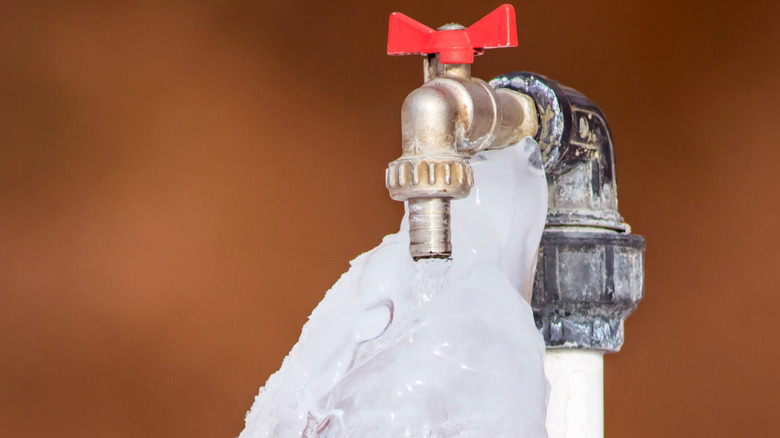Ways to Maintain Your Pipes from Freezing Damage: Crucial Guidance
Ways to Maintain Your Pipes from Freezing Damage: Crucial Guidance
Blog Article
Just how do you feel with regards to How to prepare your home plumbing for winter weather?

Winter can ruin your pipes, especially by freezing pipes. Right here's how to prevent it from taking place and what to do if it does.
Introduction
As temperatures decrease, the threat of frozen pipelines rises, possibly leading to costly repair work and water damage. Understanding just how to avoid frozen pipelines is vital for house owners in cold environments.
Comprehending Icy Pipes
What causes pipelines to freeze?
Pipelines freeze when exposed to temperature levels listed below 32 ° F (0 ° C) for prolonged periods. As water inside the pipelines freezes, it expands, putting pressure on the pipe walls and possibly triggering them to rupture.
Threats and problems
Icy pipes can result in water supply disruptions, building damage, and expensive repair services. Ruptured pipelines can flooding homes and trigger extensive structural damages.
Signs of Frozen Piping
Identifying frozen pipelines early can avoid them from bursting.
How to determine frozen pipes
Seek lowered water flow from taps, uncommon smells or sounds from pipelines, and visible frost on subjected pipelines.
Prevention Tips
Shielding susceptible pipelines
Cover pipes in insulation sleeves or utilize warm tape to safeguard them from freezing temperature levels. Concentrate on pipes in unheated or outside locations of the home.
Home heating strategies
Keep interior spaces adequately heated up, particularly areas with plumbing. Open up cupboard doors to permit cozy air to circulate around pipelines under sinks.
Securing Exterior Pipes
Yard hose pipes and outside taps
Detach and drain garden tubes prior to winter. Mount frost-proof spigots or cover exterior taps with insulated caps.
What to Do If Your Pipes Freeze
Immediate activities to take
If you believe frozen pipelines, maintain faucets open up to soothe stress as the ice thaws. Utilize a hairdryer or towels soaked in hot water to thaw pipes gradually.
Long-Term Solutions
Architectural modifications
Consider rerouting pipelines away from outside walls or unheated areas. Add extra insulation to attic rooms, cellars, and crawl spaces.
Updating insulation
Purchase top quality insulation for pipelines, attics, and walls. Appropriate insulation aids maintain regular temperatures and decreases the threat of frozen pipes.
Verdict
Preventing frozen pipes requires aggressive steps and quick feedbacks. By comprehending the reasons, indications, and preventive measures, property owners can shield their plumbing throughout winter.
5 Ways to Prevent Frozen Pipes
Drain Outdoor Faucets and Disconnect Hoses
First, close the shut-off valve that controls the flow of water in the pipe to your outdoor faucet. Then, head outside to disconnect and drain your hose and open the outdoor faucet to allow the water to completely drain out of the line. Turn off the faucet when done. Finally, head back to the shut-off valve and drain the remaining water inside the pipe into a bucket or container. Additionally, if you have a home irrigation system, you should consider hiring an expert to clear the system of water each year.
Insulate Pipes
One of the best and most cost-effective methods for preventing frozen water pipes is to wrap your pipes with insulation. This is especially important for areas in your home that aren’t exposed to heat, such as an attic. We suggest using foam sleeves, which can typically be found at your local hardware store.
Keep Heat Running at 65
Your pipes are located inside your walls, and the temperature there is much colder than the rest of the house. To prevent your pipes from freezing, The Insurance Information Institute suggests that you keep your home heated to at least 65 degrees, even when traveling. You may want to invest in smart devices that can keep an eye on the temperature in your home while you’re away.
Leave Water Dripping
Moving water — even a small trickle — can prevent ice from forming inside your pipes. When freezing temps are imminent, start a drip of water from all faucets that serve exposed pipes. Leaving a few faucets running will also help relieve pressure inside the pipes and help prevent a rupture if the water inside freezes.
Open Cupboard Doors
Warm your kitchen and bathroom pipes by opening cupboards and vanities. You should also leave your interior doors ajar to help warm air circulate evenly throughout your home.
:strip_icc()/snow-outdoor-faucet-pipes-4af65d1e5e904fb1aa7bf74071fe5d89.jpg)
We are very fascinated by Helpful Tips to Prevent Frozen Pipes this Winter and I hope you enjoyed the entire blog post. I beg you take the opportunity to distribute this article if you enjoyed it. We love your readership.
Book Today Report this page